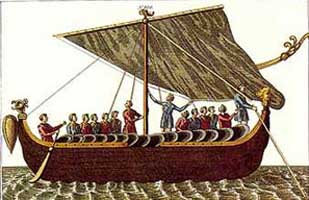Medieval Folk Ballads

 |
Drinking the blood-red wine: "0 where will I get a good sailor, To sail this ship of mine?"
Up and spoke an ancient knight,
The king has written a broad letter,
The first line that Sir Patrick read,
"0 who is this has done this deed,
"Make haste, make haste, my merry men all
"Late, late yesterday evening I saw the new moon,
O our Scots nobles were right loath
O long, long may their ladies sit,
O long, long may the ladles stand,
Halfway over, halfway over to Aberdour, |
2) From whom does the king get the idea of having Sir Patrick Spens sail for him? 3) How does Sir Patrick Spens react to the king's letter? 4) Why do you think the king's wine is described as "blood-red"? 5) Why does Sir Patrick Spens view the king's request as an "ill deed"? 6) In the seventh stanza, why does the sailor think the voyage is ill-fated? 7) What happens to the Scots lords who dislike the idea of getting their "cork-heeled shoes" wet? How do you know? How is this outcome ironic? 8) In what way does Sir Patrick Spens seem to embody Medieval ideals of duty? |
And a gay time it was then, When our goodwife got puddings to make, She's boild them in the pan.
The wind sae cauld blew south and north.
"My hand is in my hussyfskap,
They made a paction tween them twa.
Then by there came two gentlemen,
"Now whether is this a rich man's house,
And first they ate the white puddings,
Then said the one unto the other,
"But there's nae water in the house,
O up then started our goodman,
Then up and started our goodwife, |
2) What agreement do the husband and wife reach about barring the door? 3) To whom does the word one refer in line 29? 4) What do the two strangers plan to do to the goodman and what do they plan to do to his wife? 5) Who eventually wins the contest? Why? 6) Why does the goodman want the door barred? 7) When do the goodman and his wife first become aware of the presence of the strangers? 8) In lines 25-29, the goodwife is thinking to herself about what? 9) What do you think the stranger means when he suggests taking "aff the auld man's beard"? 10) What serious point does this humorous ballad make? |
I heard twa corbies making a mane. The tane unto the tither did say, "Whar sail we gang and dine the day?"
"In behint yon auld fall dyke,
"His hound is to the hunting gane,
"Ye'll sit on his white hause-bane,
"Mony a one for him maks mane, |
2) Who besides the ravens knows what has happened to the knight? 3) Why is the knight's lady not interested in his fate? 4) What does one of the ravens suggest doing with the knight's golden hair? 5) How would You describe the tone of ballad? How does the tone add to ballad's impact? 6) What effect is produced by having raven rather than human narrators? |
When the green leaves were a-fallin'; That Sir John Graeme in the West Country Fell in love with Barbara Allan.
He sent his man down through the town
O slowly, slowly rase she up,
"0 it's I'm sick, and very, very sick,
"0 dinna ye mind, young man," said she,
He turned his face unto the wall,
And slowly, slowly rase she up,
She had not gane a mile but twa,
"0 mother, mother, make my bed, |
2) What are Barbara Allan's first words when she sees Sir John? 3 ) According to Sir John, why is he "sick, and very very sick"? 4) What reason does Barbara Allan give for acting unconcerned about his plight? 5) When does Barbara Allan admit how she feels about Sir John? How does she feel? 6) At what point does the ballad make you critical of Barbara Allan? When does it make you sympathize with her? 7) One critic thinks that Sir John acts "like a spineless lover who gave up the ghost without a struggle." How would you answer that criticism? |